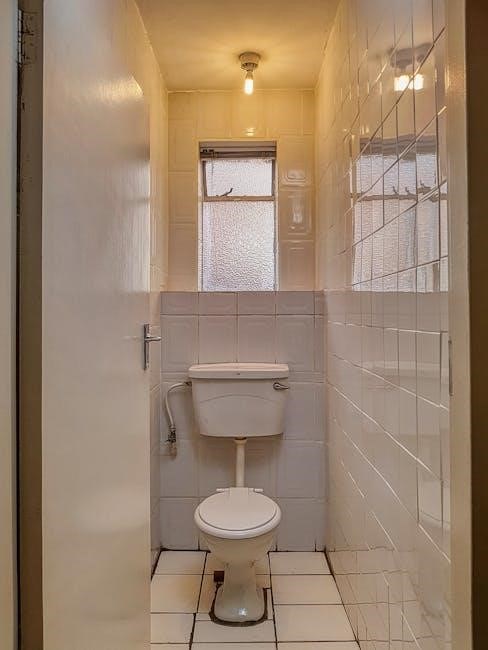dc personal property tax instructions
Overview of DC Personal Property Tax
The DC Personal Property Tax is an annual levy on tangible personal property within Washington, D.C., including furniture, equipment, vehicles, and inventory. It funds public services and infrastructure, with rates applied to assessed values. Administered by the Office of Tax and Revenue (OTR), the tax applies to businesses and individuals. Understanding this tax is essential for compliance and financial planning.
1.1 Definition and Purpose
The DC Personal Property Tax is an annual levy on tangible personal property in Washington, D.C., encompassing furniture, equipment, vehicles, and inventory. Administered by the Office of Tax and Revenue (OTR), it applies to businesses and individuals owning such assets. The tax generates essential revenue to fund public services, infrastructure, and community programs within the District, ensuring the delivery of vital amenities and contributing to the local economy. Compliance with this tax is crucial for supporting municipal operations and maintaining community resources.
1.2 Legal Basis and Authority
The DC Personal Property Tax is established under Title 47 of the DC Official Code, which outlines the legal framework for taxing tangible personal property. The Office of Tax and Revenue (OTR) is authorized to assess, collect, and enforce this tax. The tax applies to all tangible personal property located in Washington, D.C;, and is used to fund municipal services and infrastructure. The legal basis ensures compliance and fairness in taxation, with clear guidelines for property owners and businesses. This authority is essential for maintaining public revenue and supporting local government operations.

Types of Taxable Personal Property
Taxable personal property in DC includes business inventory, furniture, fixtures, equipment, vehicles, and leased property. These items are subject to annual assessment and taxation.
2.1 Business Inventory and Supplies
Business inventory and supplies are taxable under DC Personal Property Tax. This includes goods held for sale, raw materials, and supplies used in operations. Inventory is valued at its cost or market price, while supplies are taxed based on their fair market value. Businesses must report these items annually, with assessments conducted by the Office of Tax and Revenue (OTR). Accurate reporting is crucial to avoid penalties. The tax applies to all businesses operating in DC, ensuring compliance with local regulations. Proper documentation is required for valuation and assessment purposes.
2.2 Furniture, Fixtures, and Equipment
Furniture, fixtures, and equipment (FF&E) are taxable under the DC Personal Property Tax. This includes items such as desks, chairs, machinery, and equipment used in business operations. Fixtures attached to a property, like lighting or plumbing, are also subject to taxation. These assets are valued at their fair market value or cost, depending on their condition and age. Businesses must report FF&E annually, with the Office of Tax and Revenue (OTR) assessing the taxable value. Accurate reporting is essential to ensure compliance and avoid penalties. Proper documentation, such as purchase records, is required for valuation purposes.
2.3 Vehicles and Leased Property
Vehicles and leased property are subject to the DC Personal Property Tax. This includes cars, trucks, and other motor vehicles used for business purposes. Leased property, such as vehicles or equipment, is also taxable, whether leased to or from the business. The taxable value is typically based on the fair market value or annual lease payments. Businesses must report these assets annually, ensuring accurate valuations and compliance. Proper documentation, such as vehicle registrations or lease agreements, is required to support reported values. Failure to report leased property or vehicles may result in penalties, emphasizing the importance of detailed record-keeping.

Who Must File
Individuals, corporations, partnerships, executors, administrators, guardians, receivers, and trustees owning or holding personal property in DC must file. Compliance is mandatory to avoid penalties.
3.1 Individuals and Corporations
Individuals and corporations in DC must file personal property tax returns if they own or hold tangible personal property. This includes assets like business equipment, inventory, and vehicles. Corporations must report all tangible assets used in operations. Individuals, such as rental property owners or freelancers, must also file if their property is used for business purposes. Accurate reporting of property value ensures compliance with tax laws and avoids penalties. The Office of Tax and Revenue (OTR) provides guidelines for valuation and filing.
3.2 Partnerships and Other Entities
Partnerships, limited liability companies (LLCs), and other business entities in DC must file personal property tax returns if they own or hold tangible property. This includes partnerships, trusts, estates, and other legal entities. All entities conducting business in DC must report their personal property, such as equipment, inventory, and vehicles. Accurate reporting ensures compliance with tax laws and avoids penalties. The Office of Tax and Revenue (OTR) provides specific guidelines for these entities to accurately assess and report their property values, ensuring proper tax calculation and timely payment.

Assessment and Valuation Process
The DC Office of Tax and Revenue assesses personal property based on reported values and market analysis, ensuring fair and accurate valuations for tax purposes annually.
4.1 How Personal Property is Assessed
The assessment of personal property in Washington, D.C., is based on reported values and market analysis. Businesses and individuals submit details of their tangible property, such as furniture, equipment, and vehicles, annually. The Office of Tax and Revenue (OTR) reviews these submissions to determine fair market value. Assessments consider depreciation, condition, and classification of property. Accurate reporting is crucial to ensure proper valuation. The OTR may adjust values based on industry standards or appraisals. This process ensures equitable taxation across all property types, aligning with legal requirements and promoting compliance.
4.2 Role of the Office of Tax and Revenue
The Office of Tax and Revenue (OTR) is responsible for assessing, billing, and collecting personal property taxes in Washington, D.C. The OTR evaluates property values, processes tax returns, and ensures compliance with tax laws. It provides guidance on filing requirements, manages tax bill distribution, and handles collections. The OTR also offers online platforms like MyTax.DC.gov for convenient access to tax services. Its role includes verifying accurate reporting, addressing taxpayer inquiries, and enforcing tax compliance. The OTR ensures fair and efficient administration of personal property taxes, maintaining transparency and supporting taxpayers throughout the process.
4.3 Importance of Accurate Reporting
Accurate reporting is crucial for ensuring proper assessment and compliance with DC Personal Property Tax requirements. Inaccuracies can lead to overpayment, underpayment, or penalties. Taxpayers must provide detailed and truthful information about their personal property, including its value and classification. The Office of Tax and Revenue relies on this data to determine fair tax assessments. Incomplete or incorrect filings can result in audits, fines, and delays. Staying informed and adhering to reporting guidelines helps maintain compliance and avoids legal consequences. Utilizing resources like MyTax.DC.gov ensures accurate submissions and streamlined processing.

Filing Instructions
Taxpayers must file their DC Personal Property Tax returns annually by July 31. Use MyTax.DC.gov to submit online. Ensure all required documentation is attached.
5.1 When and How to File
The DC Personal Property Tax return must be filed annually by July 31. Taxpayers can file online via MyTax.DC.gov or submit a paper return. Online filing is faster and more convenient, with options to upload required documentation. Ensure all details are accurate and complete to avoid delays. Payments can be made online or by mail, with payment plans available for those unable to pay in full; Late filings may incur penalties, so timely submission is crucial. For assistance, contact the Office of Tax and Revenue (OTR) directly.
5.2 Required Documentation
To file the DC Personal Property Tax, specific documentation is required. Businesses must provide an accurate inventory list of taxable property, including furniture, fixtures, and equipment. Depreciation schedules and proof of acquisitions or disposals are also necessary. For individuals, documentation may include receipts for purchases or sales of taxable items. Exemption claims require supporting evidence, such as receipts or certifications. Ensure all records are up-to-date and organized, as the Office of Tax and Revenue (OTR) may request additional details during audits. Maintaining clear documentation helps ensure compliance and avoids potential penalties.
5.3 Payment Options and Deadlines
The DC Personal Property Tax offers multiple payment options for convenience. Payments can be made online via MyTax.DC.gov using e-check, credit, or debit cards. Mailed checks are also accepted and must be postmarked by the deadline. In-person payments are accepted at the Office of Tax and Revenue. The deadline for payment is typically September 15th for the first installment, with the final payment due March 15th. Late payments incur penalties and interest, so timely submission is crucial to avoid additional charges. Ensure payments are made by the stated deadlines to maintain compliance and avoid fines.

Calculating the Tax
The DC Personal Property Tax is calculated based on the assessed value of taxable property. Rates apply to this value, with specific exemptions deducted. Payments are due annually.
6.1 Determining the Tax Base
The tax base for DC Personal Property Tax is the assessed value of taxable property. This value is determined annually by the Office of Tax and Revenue (OTR). Businesses and individuals must report all tangible personal property, such as furniture, fixtures, equipment, vehicles, and inventory. The assessment considers the property’s condition, age, and market value. Exemptions may reduce the taxable amount. Accurate reporting is crucial to ensure the correct tax base calculation. OTR provides guidelines and forms to aid in this process, ensuring compliance with DC tax regulations.
6.2 Applying Tax Rates and Exemptions
The DC Personal Property Tax applies a rate of 0.85% per $100 of assessed value for residential properties and 1.25% for commercial properties. Exemptions may reduce the taxable amount, such as for certain veterans, seniors, or religious organizations. Businesses and individuals must apply for exemptions through the Office of Tax and Revenue (OTR) by submitting required documentation. Understanding the applicable rates and exemptions ensures accurate tax calculation. OTR provides guidelines to help taxpayers navigate the process and claim eligible reductions, minimizing their tax liability while adhering to DC tax regulations.
6.3 Understanding Assessments and Bills
The Office of Tax and Revenue (OTR) determines the taxable value of personal property annually. Tax bills are mailed to property owners, detailing the assessed value, applicable exemptions, and payment deadlines. Bills outline the calculated tax, payment methods, and due dates. Property owners can access their bills online via MyTax.DC.gov or through traditional mail. It’s crucial to review the bill for accuracy and pay by the deadline to avoid penalties. Understanding the assessment process ensures compliance with DC tax regulations and helps property owners manage their financial obligations effectively. Timely payment is essential to maintain good standing with tax authorities.
6.4 Penalties for Late Payment
Failing to pay DC Personal Property Tax by the deadline results in penalties and interest. Late payments incur a penalty of 5% of the unpaid tax, plus interest on the outstanding balance. Continued non-payment can lead to additional fees and collection actions. Property owners should ensure timely payments to avoid these penalties. The Office of Tax and Revenue (OTR) offers multiple payment methods, including online payments via MyTax.DC.gov, to facilitate timely tax settlements. Ignoring payment deadlines can escalate financial obligations, making it crucial to prioritize tax payments to maintain compliance and avoid unnecessary costs.

Tax Relief and Exemptions
The District of Columbia offers tax relief and exemptions for eligible individuals and businesses. These include credits for specific property types and special programs. Proper documentation is required.
7.1 Available Exemptions and Deductions
The District of Columbia provides several exemptions and deductions for personal property tax. These include exemptions for certain types of property, such as qualifying business inventory, and deductions for specific equipment or assets. Additionally, senior citizens, veterans, and religious organizations may qualify for reduced tax rates or full exemptions. Businesses and individuals must submit proper documentation to claim these exemptions. The Office of Tax and Revenue (OTR) outlines eligibility criteria and required forms. Understanding these options can significantly reduce tax liabilities. Always consult official guidelines for the most accurate and up-to-date information.
7.2 Credits and Special Programs
The District of Columbia offers various tax credits and special programs to reduce personal property tax liabilities. These include credits for renewable energy investments, historic property renovations, and incentives for businesses in targeted industries. Additional programs provide relief for low-income individuals and certain nonprofit organizations. Specific initiatives may require pre-approval or adherence to eligibility criteria. Credits can significantly lower tax burdens, and special programs may offer exemptions or reduced rates. Detailed information on these opportunities is available through the Office of Tax and Revenue (OTR), ensuring taxpayers can maximize their savings while complying with all requirements.
7.3 Applying for Relief
To apply for tax relief, individuals and businesses must submit required documentation to the Office of Tax and Revenue (OTR). Eligibility varies by program, but applicants must meet specific criteria, such as income thresholds or property use. Forms and supporting documents, like financial statements or proof of eligibility, must be filed by deadlines. Applications can often be submitted online via MyTax.DC.gov or in person. The OTR reviews each case to determine eligibility and processes approved relief promptly. Applicants are encouraged to submit complete and accurate information to avoid delays. Relief is typically applied to the tax bill, reducing the payable amount.
Role of the Office of Tax and Revenue
The Office of Tax and Revenue (OTR) manages and enforces DC’s tax laws, including personal property tax. It assesses property values, processes tax returns, and collects payments.
8.1 Responsibilities and Functions
The Office of Tax and Revenue (OTR) is responsible for administering DC’s tax laws, including personal property tax. It processes tax returns, assesses property values, and ensures compliance. OTR also provides online platforms like MyTax.DC.gov for tax payments and information retrieval. The office distributes tax bills, collects payments, and maintains accurate records. OTR’s functions include enforcing tax regulations, resolving disputes, and offering taxpayer assistance. Its role is crucial for ensuring fair and efficient tax administration in the District of Columbia.
8.2 Tax Bill Distribution and Collection
The Office of Tax and Revenue (OTR) distributes tax bills annually, providing detailed information on assessed values, tax amounts, and due dates. Bills are sent electronically through MyTax.DC.gov or by mail. Taxpayers can access their bills online, view payment history, and submit payments securely. Payments can be made via electronic check, credit card, or mail. The OTR ensures timely collection of taxes, with penalties applied for late payments. This process maintains revenue flow for public services and infrastructure in the District of Columbia, ensuring compliance and fiscal accountability.
8.3 Maintaining Accurate Records
Maintaining accurate records is crucial for compliance with DC Personal Property Tax requirements. Taxpayers must retain detailed documentation, including receipts, invoices, and asset lists. Records should reflect the acquisition, disposition, and depreciation of personal property. The Office of Tax and Revenue (OTR) may request these records for audits or verification. Accurate reporting ensures proper assessments and avoids penalties. Taxpayers should regularly update their records to reflect changes in ownership or value. This practice supports transparency and facilitates smooth tax filings, ensuring accountability and adherence to District regulations.
Understanding Your Tax Bill
Your tax bill outlines the assessed value, tax rate, and total amount due. Use MyTax.DC.gov to view and pay your bill, ensuring compliance and timely payments.
9.1 Reading and Interpreting the Bill
Understanding your DC Personal Property Tax bill is crucial for compliance. The bill details the assessed value of your property, the applicable tax rate, and the total amount due. Review the bill to ensure accuracy, as it outlines the tax base, calculated tax, and any exemptions applied. Due dates are clearly stated, and late payments incur penalties. Use MyTax.DC.gov to access your bill digitally, verify details, and confirm payment status. This platform provides a clear breakdown of charges, ensuring transparency and ease of understanding for taxpayers.
9.2 Payment Methods and Options
The District of Columbia offers multiple convenient payment methods for personal property taxes. Taxpayers can pay online through MyTax.DC.gov using credit/debit cards or e-checks. Payments can also be made by phone, mail, or in person at designated locations; Checks and money orders are accepted, with proper documentation required. The online portal provides a secure and efficient way to process payments, with immediate confirmation. Ensure timely payment to avoid penalties, as deadlines are strictly enforced. Additional options, such as payment plans for unpaid balances, may be available under certain conditions, promoting flexibility for taxpayers.
9.4 Online Platforms (e.g., MyTax.DC.gov)
MyTax.DC.gov is the District of Columbia’s official online tax portal, offering a convenient and secure way to manage personal property taxes. Users can view tax bills, make payments, and file returns 24/7. The platform supports various payment methods, including credit/debit cards and e-checks. It also provides access to payment history, filing status, and account updates. This platform streamlines tax compliance, reducing paperwork and saving time. With robust security measures, MyTax.DC.gov ensures safe transactions and data protection. It’s an essential tool for individuals and businesses to efficiently handle their tax obligations in the District of Columbia.

Compliance and Consequences
Adhering to DC Personal Property Tax regulations is crucial to avoid legal consequences, including penalties and potential closure of businesses that fail to comply with OTR requirements.
10.1 Importance of Compliance
Compliance with DC Personal Property Tax requirements is essential to avoid penalties, ensure smooth business operations, and support public services. Non-compliance can lead to fines, audits, and even legal action. Accurate reporting and timely payments are critical to maintaining good standing with the Office of Tax and Revenue (OTR). Failure to comply can result in increased financial burdens and damage to your business reputation. Staying informed about tax laws and deadlines ensures adherence to regulations and prevents costly errors. Compliance also facilitates efficient administration of public funds, benefiting the community. It is a shared responsibility for all taxpayers in the District of Columbia.
10.2 Penalties for Non-Compliance
Non-compliance with DC Personal Property Tax obligations can result in significant penalties, including fines, interest, and late fees. Failure to file or pay taxes on time may lead to a 5% penalty on the unpaid amount, plus interest accrued monthly. Unpaid taxes can also trigger collection actions, such as liens or levies on property. Repeated non-compliance may escalate penalties and lead to audits or legal proceedings. These penalties can harm your financial standing and business reputation. Understanding and adhering to tax requirements helps avoid these consequences and ensures smooth operations.
10.3 Avoiding Common Mistakes
To avoid common mistakes, ensure accurate reporting of personal property details and timely filing. Misclassifying assets or undervaluing property can lead to audits and penalties. Missing deadlines for filing or payment results in late fees and interest. Failure to update records when property is sold or disposed of can lead to unnecessary assessments. Double-check all submissions for completeness and accuracy. Maintain clear documentation to support your filings. Consult professionals if unsure about tax obligations to ensure compliance and avoid costly errors. Proactive attention to detail helps prevent issues and ensures smooth tax processes.
Additional Resources
For additional guidance, visit MyTax.DC.gov for filing, payments, and FAQs. Contact the Office of Tax and Revenue for detailed resources and support with DC personal property tax matters.
11.1 Contact Information
For assistance with DC Personal Property Tax, contact the Office of Tax and Revenue (OTR) at (202) 727-4TAX (4829) or via email at tax_seqs@dc.gov. Visit their office at 1101 4th Street, SW, Washington, DC 20024, Monday–Friday, 8:30 AM–4:30 PM. Additional resources and support are available on their official website at otr.cfo.dc.gov. For online services, including filing and payments, access the MyTax.DC.gov portal. Representatives are available to address inquiries and provide guidance on personal property tax matters.
11.2 Frequently Asked Questions
Common questions about DC Personal Property Tax include eligibility, filing deadlines, and payment methods. Property owners often inquire about exemptions and deductions. Others ask about tax rates and how assessments are determined. For detailed answers, visit otr.cfo.dc.gov or contact OTR directly. FAQs also address topics like late penalties, amended returns, and record-keeping requirements. Understanding these aspects ensures compliance and simplifies the tax process for individuals and businesses. Additional resources are available on MyTax.DC.gov for self-service options and real-time assistance.